七年级《牛津初中英语预备课程》教学案
- 格式:doc
- 大小:2.07 MB
- 文档页数:13
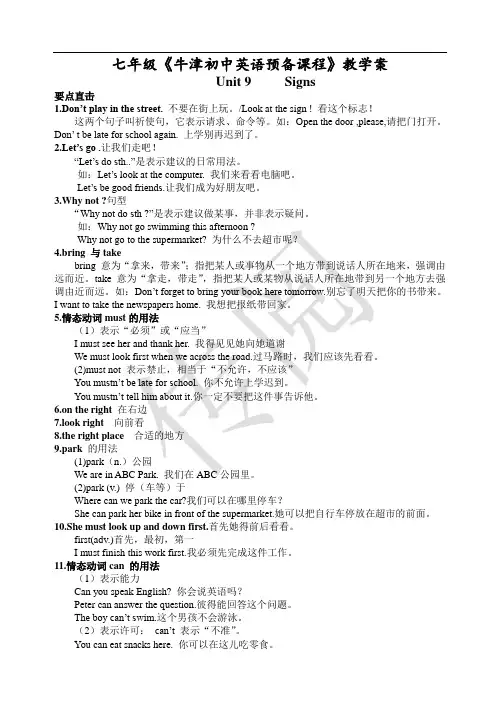
七年级《牛津初中英语预备课程》教学案Unit 9 Signs要点直击1.Don’t play in the street. 不要在街上玩。
/Look at the sign ! 看这个标志!这两个句子叫祈使句,它表示请求、命令等。
如:Open the door ,please,请把门打开。
Don’ t be late for school again. 上学别再迟到了。
2.Let’s go .让我们走吧!“Let’s do sth..”是表示建议的日常用法。
如:Let’s look at the computer. 我们来看看电脑吧。
L et’s be good friends.让我们成为好朋友吧。
3.Why not ?句型“W hy not do sth ?”是表示建议做某事,并非表示疑问。
如:Why not go swimming this afternoon ?Why not go to the supermarket? 为什么不去超市呢?4.bring 与takebring 意为“拿来,带来”;指把某人或事物从一个地方带到说话人所在地来,强调由远而近。
take 意为“拿走,带走”,指把某人或某物从说话人所在地带到另一个地方去强调由近而远。
如:Don’t forget to bring your book here tomorrow.别忘了明天把你的书带来。
I want to take the newspapers home. 我想把报纸带回家。
5.情态动词must的用法(1)表示“必须”或“应当”I must see her and thank her. 我得见见她向她道谢We must look first when we across the road.过马路时,我们应该先看看。
(2)must not 表示禁止,相当于“不允许,不应该”You mustn’t be late for school. 你不允许上学迟到。
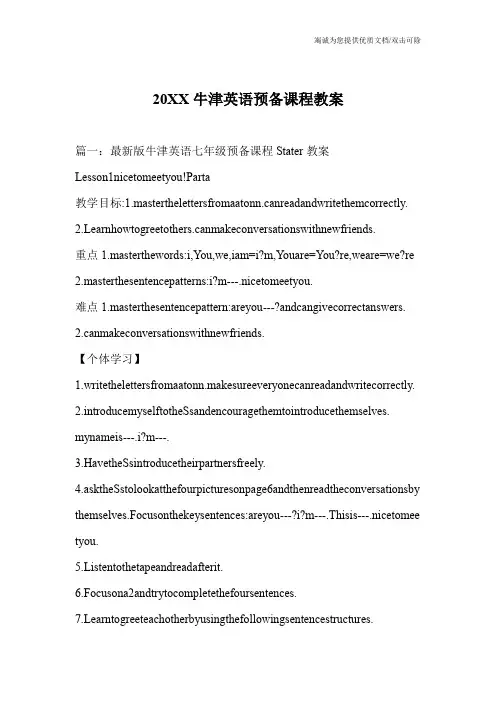
20XX牛津英语预备课程教案篇一:最新版牛津英语七年级预备课程Stater教案Lesson1nicetomeetyou!Parta教学目标:1.masterthelettersfromaatonn.canreadandwritethemcorrectly. 2.Learnhowtogreetothers.canmakeconversationswithnewfriends.重点1.masterthewords:i,You,we,iam=i?m,Youare=You?re,weare=we?re 2.masterthesentencepatterns:i?m---.nicetomeetyou.难点1.masterthesentencepattern:areyou---?andcangivecorrectanswers. 2.canmakeconversationswithnewfriends.【个体学习】1.writethelettersfromaatonn.makesureeveryonecanreadandwritecorrectly.2.introducemyselftotheSsandencouragethemtointroducethemselves. mynameis---.i?m---.3.HavetheSsintroducetheirpartnersfreely.4.asktheSstolookatthefourpicturesonpage6andthenreadtheconversationsby themselves.Focusonthekeysentences:areyou---?i?m---.Thisis---.nicetomee tyou.5.Listentothetapeandreadafterit.6.Focusona2andtrytocompletethefoursentences.7.Learntogreeteachotherbyusingthefollowingsentencestructures.Goodmorning/afternoon/evening/night.what?syourname?i?m---.Howareyoutoday?i?mfine.Thankyou.Goodbye. 【同伴互导】1.EncouragetheSstogreettheirpartners.2.asktheSstoreadtheconversationsinPartconpageeight.3.Readafterthetapeandtrytoactitout.4.Readandmastertheusefulexpressionsonpage9.【教师解难】1.Talkaboutthedifficultiesingroups.2.GivetheSssomeexplanationsifnecessary.【练习检测】一英汉互译。
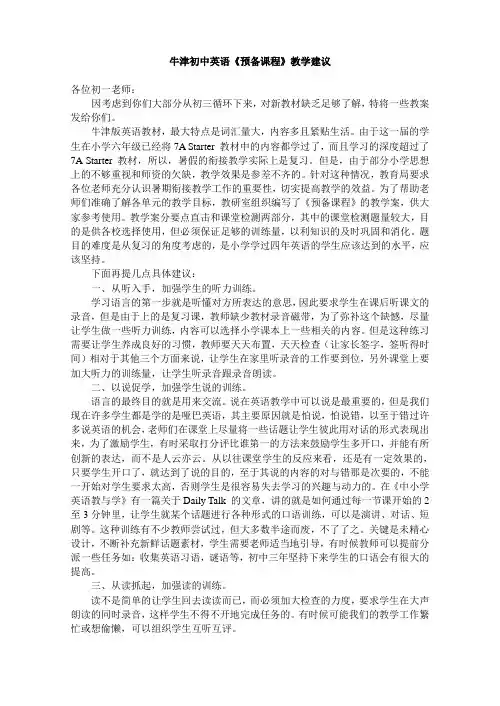
牛津初中英语《预备课程》教学建议各位初一老师:因考虑到你们大部分从初三循环下来,对新教材缺乏足够了解,特将一些教案发给你们。
牛津版英语教材,最大特点是词汇量大,内容多且紧贴生活。
由于这一届的学生在小学六年级已经将7A Starter 教材中的内容都学过了,而且学习的深度超过了7A Starter 教材,所以,暑假的衔接教学实际上是复习。
但是,由于部分小学思想上的不够重视和师资的欠缺,教学效果是参差不齐的。
针对这种情况,教育局要求各位老师充分认识暑期衔接教学工作的重要性,切实提高教学的效益。
为了帮助老师们准确了解各单元的教学目标,教研室组织编写了《预备课程》的教学案,供大家参考使用。
教学案分要点直击和课堂检测两部分,其中的课堂检测题量较大,目的是供各校选择使用,但必须保证足够的训练量,以利知识的及时巩固和消化。
题目的难度是从复习的角度考虑的,是小学学过四年英语的学生应该达到的水平,应该坚持。
下面再提几点具体建议:一、从听入手,加强学生的听力训练。
学习语言的第一步就是听懂对方所表达的意思,因此要求学生在课后听课文的录音,但是由于上的是复习课,教师缺少教材录音磁带,为了弥补这个缺憾,尽量让学生做一些听力训练,内容可以选择小学课本上一些相关的内容。
但是这种练习需要让学生养成良好的习惯,教师要天天布置,天天检查(让家长签字,签听得时间)相对于其他三个方面来说,让学生在家里听录音的工作要到位,另外课堂上要加大听力的训练量,让学生听录音跟录音朗读。
二、以说促学,加强学生说的训练。
语言的最终目的就是用来交流。
说在英语教学中可以说是最重要的,但是我们现在许多学生都是学的是哑巴英语,其主要原因就是怕说,怕说错,以至于错过许多说英语的机会,老师们在课堂上尽量将一些话题让学生彼此用对话的形式表现出来,为了激励学生,有时采取打分评比谁第一的方法来鼓励学生多开口,并能有所创新的表达,而不是人云亦云。
从以往课堂学生的反应来看,还是有一定效果的,只要学生开口了,就达到了说的目的,至于其说的内容的对与错那是次要的,不能一开始对学生要求太高,否则学生是很容易失去学习的兴趣与动力的。
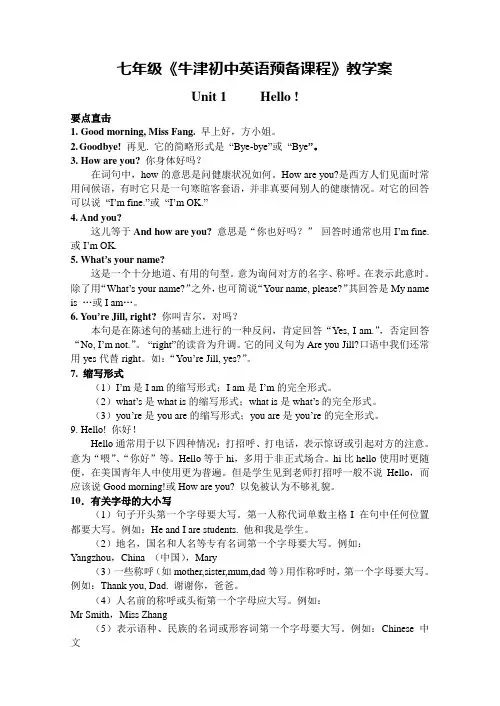
七年级《牛津初中英语预备课程》教学案Unit 1 Hello !要点直击1. Good morning, Miss Fang. 早上好,方小姐。
2.Goodbye! 再见. 它的简略形式是“Bye-bye”或“Bye”。
3. How are you? 你身体好吗?在词句中,how的意思是问健康状况如何。
How are you?是西方人们见面时常用问候语,有时它只是一句寒睻客套语,并非真要问别人的健康情况。
对它的回答可以说“I’m fine.”或“I’m OK.”4. And you?这儿等于And how are you? 意思是“你也好吗?”回答时通常也用I’m fine.或I’m OK.5. What’s your name?这是一个十分地道、有用的句型。
意为询问对方的名字、称呼。
在表示此意时。
除了用“What’s your name?”之外,也可简说“Your name, please?”其回答是My name is …或I am…。
6. You’re Jill, right? 你叫吉尔,对吗?本句是在陈述句的基础上进行的一种反问,肯定回答“Yes, I am.”,否定回答“No, I’m not.”。
“right”的读音为升调。
它的同义句为Are you Jill?口语中我们还常用yes代替right。
如:“You’re Jill, yes?”。
7. 缩写形式(1)I’m是I am的缩写形式;I am是I’m的完全形式。
(2)what’s是what is的缩写形式;what is是what’s的完全形式。
(3)you’re是you are的缩写形式;you are是you’re的完全形式。
9. Hello! 你好!Hello通常用于以下四种情况:打招呼、打电话,表示惊讶或引起对方的注意。
意为“喂”、“你好”等。
Hello等于hi,多用于非正式场合。
hi比hello使用时更随便,在美国青年人中使用更为普遍。
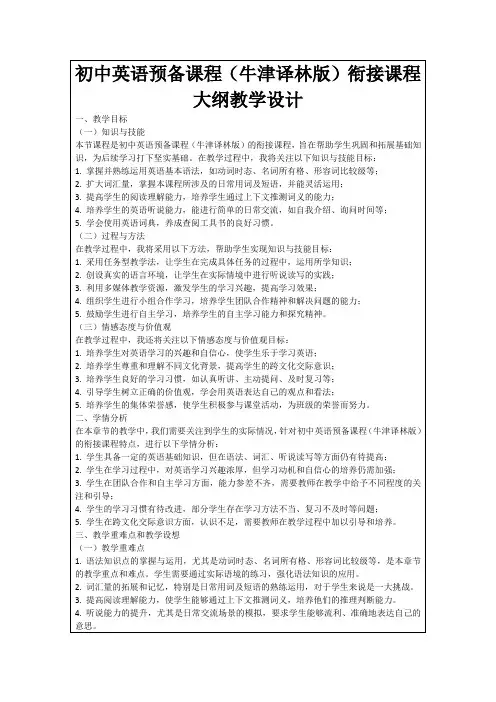
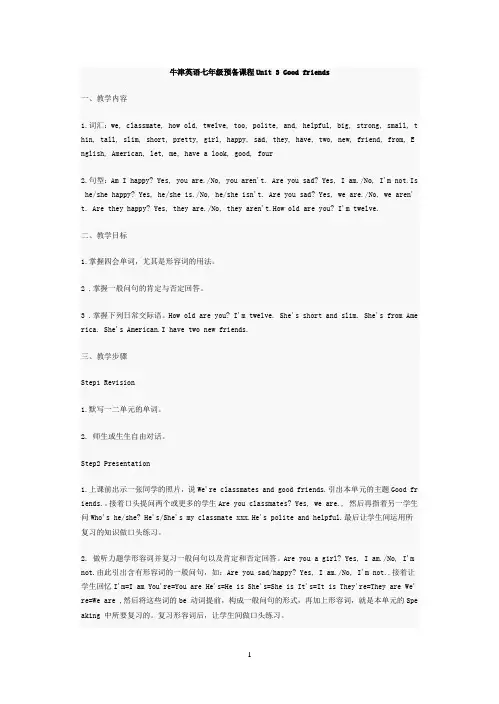
牛津英语七年级预备课程Unit 3 Good friends一、教学内容1.词汇:we, classmate, how old, twelve, too, polite, and, helpful, big, strong, small, t hin, tall, slim, short, pretty, girl, happy, sad, they, have, two, new, friend, from, E nglish, American, let, me, have a look, good, four2.句型:Am I happy? Yes, you are./No, you aren't. Are you sad? Yes, I am./No, I'm not.Is he/she happy? Yes, he/she is./No, he/she isn't. Are you sad? Yes, we are./No, we aren' t. Are they happy? Yes, they are./No, they aren't.How old are you? I'm twelve.二、教学目标1.掌握四会单词,尤其是形容词的用法。
2 .掌握一般问句的肯定与否定回答。
3 .掌握下列日常交际语。
How old are you? I'm twelve. She's short and slim. She's from Ame rica. She's American.I have two new friends.三、教学步骤Step1 Revision1.默写一二单元的单词。
2. 师生或生生自由对话。
Step2 Presentation1.上课前出示一张同学的照片,说We're classmates and good friends.引出本单元的主题Good fr iends.。
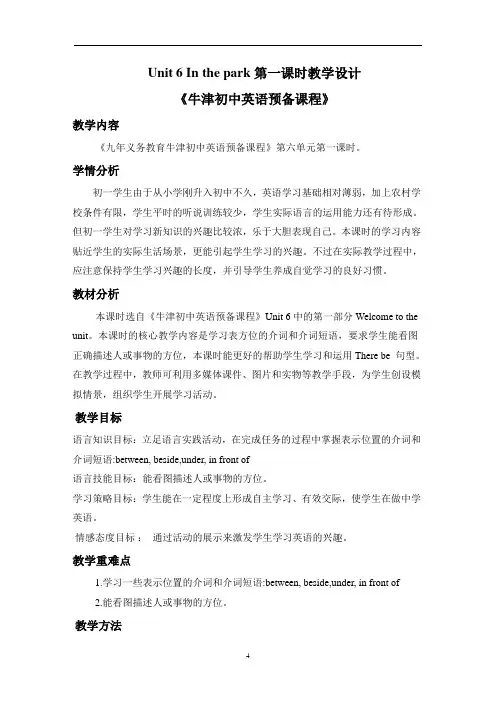
Unit 6 In the park第一课时教学设计《牛津初中英语预备课程》教学内容《九年义务教育牛津初中英语预备课程》第六单元第一课时。
学情分析初一学生由于从小学刚升入初中不久,英语学习基础相对薄弱,加上农村学校条件有限,学生平时的听说训练较少,学生实际语言的运用能力还有待形成。
但初一学生对学习新知识的兴趣比较浓,乐于大胆表现自己。
本课时的学习内容贴近学生的实际生活场景,更能引起学生学习的兴趣。
不过在实际教学过程中,应注意保持学生学习兴趣的长度,并引导学生养成自觉学习的良好习惯。
教材分析本课时选自《牛津初中英语预备课程》Unit 6中的第一部分Welcome to the unit。
本课时的核心教学内容是学习表方位的介词和介词短语,要求学生能看图正确描述人或事物的方位,本课时能更好的帮助学生学习和运用There be句型。
在教学过程中,教师可利用多媒体课件、图片和实物等教学手段,为学生创设模拟情景,组织学生开展学习活动。
教学目标语言知识目标:立足语言实践活动,在完成任务的过程中掌握表示位置的介词和介词短语:between, beside,under, in front of语言技能目标:能看图描述人或事物的方位。
学习策略目标:学生能在一定程度上形成自主学习、有效交际,使学生在做中学英语。
情感态度目标:通过活动的展示来激发学生学习英语的兴趣。
教学重难点1.学习一些表示位置的介词和介词短语:between, beside,under, in front of2.能看图描述人或事物的方位。
教学方法本节课主要采用任务与活动教学法,借助多媒体课件和实物,引导学生自主学习,以提高学生的口语交际能力为目的。
让学生通过感知、体验、实践、参与、合作交流来实现任务目标。
教师在整个活动中只起一个组织者、指导者、参与者的作用,留给学生足够的时间和空间去完成活动。
教学过程走进课本根据实际情况回答问题What’s on your desk?_______________________________What’s in your pencil box?_______________________________(设计理念:利用自己生活中的实际物品复习in, on, behind的用法,导入新课学习。
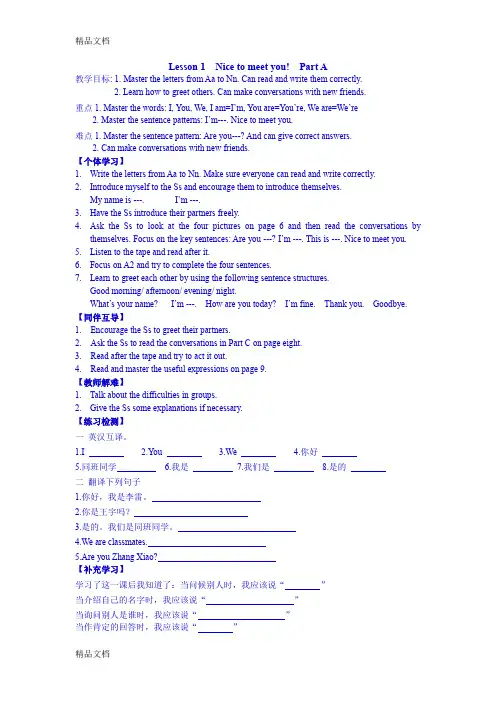
Lesson 1 Nice to meet you! Part A教学目标: 1. Master the letters from Aa to Nn. Can read and write them correctly.2. Learn how to greet others. Can make conversations with new friends.重点1. Master the words: I, You, We, I am=I’m, You are=You’re, We are=We’re2. Master the sentence patterns: I’m---. Nice to meet you.难点1. Master the sentence pattern: Are you---? And can give correct answers.2. Can make conversations with new friends.【个体学习】1.Write the letters from Aa to Nn. Make sure everyone can read and write correctly.2.Introduce myself to the Ss and encourage them to introduce themselves.My name is ---. I’m ---.3.Have the Ss introduce their partners freely.4.Ask the Ss to look at the four pictures on page 6 and then read the conversations bythemselves. Focus on the key sentences: Are you ---? I’m ---. This is ---. Nice to meet you.5.Listen to the tape and read after it.6.Focus on A2 and try to complete the four sentences.7.Learn to greet each other by using the following sentence structures.Good morning/ afternoon/ evening/ night.What’s your name? I’m ---. How are you today? I’m fine. Thank you. Goodbye. 【同伴互导】1.Encourage the Ss to greet their partners.2.Ask the Ss to read the conversations in Part C on page eight.3.Read after the tape and try to act it out.4.Read and master the useful expressions on page 9.【教师解难】1.Talk about the difficulties in groups.2.Give the Ss some explanations if necessary.【练习检测】一英汉互译。
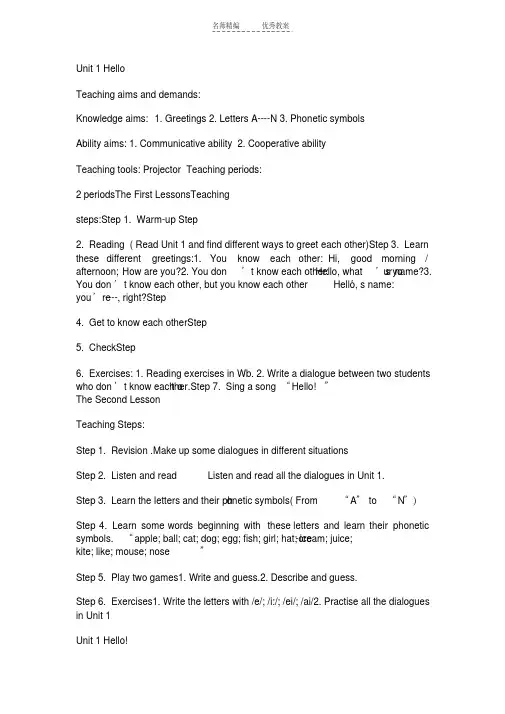
Teaching aims and demands:Knowledge aims: 1. Greetings 2. Letters A----N 3. Phonetic symbolsAbility aims: 1. Communicative ability 2. Cooperative abilityTeaching tools: Projector Teaching periods:2 periodsThe First LessonsTeachingsteps:Step 1. Warm-up Step2. Reading ( Read Unit 1 and find different ways to greet each other)Step3. Learn these different greetings:1. You know each other: Hi, good morning / afternoon; How are you?2. You don’t know each other:ur name?3.Hello, what’s yoHello,You don’t know each other, but you know each other’s name:you’re ----, right?Step4. Get to know each otherStep5. CheckStep6. Exercises: 1. Reading exercises in Wb. 2. Write a dialogue between two studentsther.Step 7. Sing a song “Hello!”who don’t know each oThe Second LessonTeaching Steps:Step 1. Revision .Make up some dialogues in different situationsStep 2. Listen and read Listen and read all the dialogues in Unit 1.Step 3. Learn the letters and their ph o netic symbols( From “A” to “N”)Step 4. Learn some words beginning with these letters and learn their phonetic-cream; juice;symbols. “apple; ball; cat; dog; egg; fish; girl; hat; icekite; like; mouse; nose”Step 5. Play two games1. Write and guess.2. Describe and guess.Step 6. Exercises1. Write the letters with /e/; /i:/; /ei/; /ai/2. Practise all the dialogues in Unit 1Unit 1 Hello!1. 词汇:hi, morning, Miss, goodbye, afernoon, I, am, fine, are, you,today,what, is, your, name, right, yes, hello,no, Mrs2. 句型:Good morning/afternoon. Goodbye! What's your name? I'm xxx.You're xxx. How are you? I'm fine. Thank you.二、教学目标1. 正确辨认和书写英文字母Aa-Nn。
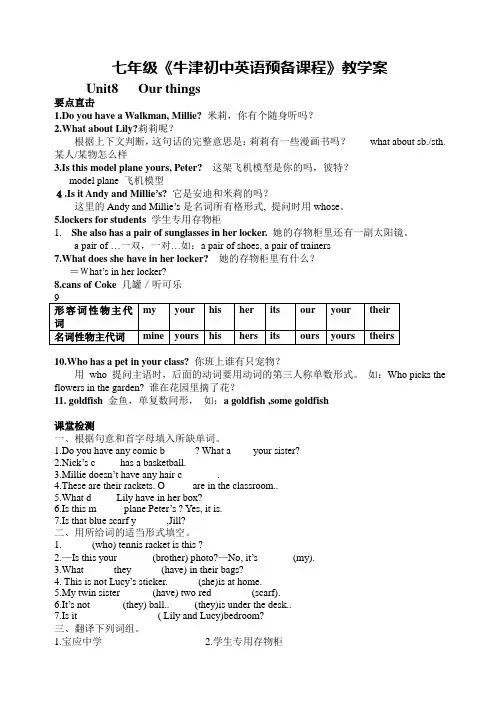
七年级《牛津初中英语预备课程》教学案Unit8 Our things要点直击1.Do you have a Walkman, Millie?米莉,你有个随身听吗?2.What about Lily?莉莉呢?根据上下文判断,这句话的完整意思是:莉莉有一些漫画书吗?what about sb./sth. 某人/某物怎么样3.Is this model plane yours, Peter? 这架飞机模型是你的吗,彼特?model plane 飞机模型4.Is it Andy and Millie’s? 它是安迪和米莉的吗?这里的Andy and Millie’s是名词所有格形式, 提问时用whose。
5.lockers for students 学生专用存物柜1.She also has a pair of sunglasses in her locker. 她的存物柜里还有一副太阳镜。
a pair of …一双,一对…如:a pair of shoes, a pair of trainers7.What does she have in her locker? 她的存物柜里有什么?=What’s in her locker?8.cans of Coke 几罐/听可乐10.Who has a pet in your class? 你班上谁有只宠物?用who 提问主语时,后面的动词要用动词的第三人称单数形式。
如:Who picks the flowers in the garden? 谁在花园里摘了花?11. goldfish 金鱼,单复数同形,如:a goldfish ,some goldfish课堂检测一、根据句意和首字母填入所缺单词。
1.Do you have any comic b______? What a ____your sister?2.Nick’s c_____has a basketball.lie doesn’t have any hair c_______.4.These are their rackets. O_____ are in the classroom..5.What d_____Lily have in her box?6.Is this m_____ plane Peter’s ? Yes, it is.7.Is that blue scarf y______,Jill?二、用所给词的适当形式填空。
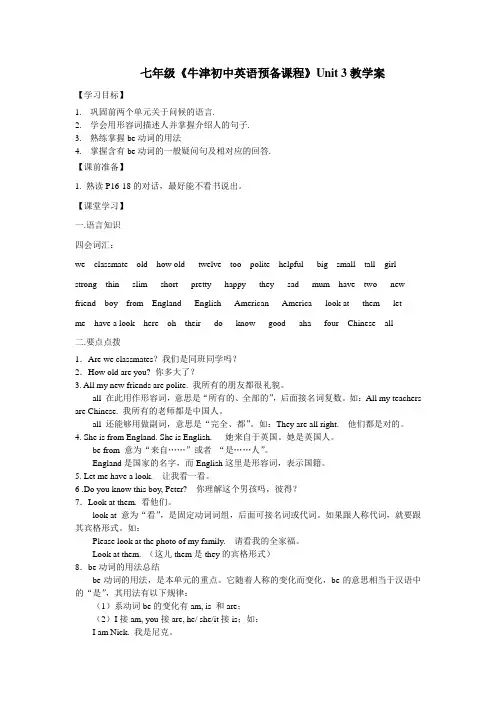
七年级《牛津初中英语预备课程》Unit 3教学案【学习目标】1.巩固前两个单元关于问候的语言.2.学会用形容词描述人并掌握介绍人的句子.3.熟练掌握be动词的用法4.掌握含有be动词的一般疑问句及相对应的回答.【课前准备】1. 熟读P16-18的对话,最好能不看书说出。
【课堂学习】一.语言知识四会词汇:we classmate old how old twelve too polite helpful big small tall girl strong thin slim short pretty happy they sad mum have two new friend boy from England English American America look at them letme have a look here oh their do know good aha four Chinese all二.要点点拨1.Are we classmates?我们是同班同学吗?2.How old are you? 你多大了?3. All my new friends are polite. 我所有的朋友都很礼貌。
all 在此用作形容词,意思是“所有的、全部的”,后面接名词复数。
如:All my teachers are Chinese. 我所有的老师都是中国人。
all 还能够用做副词,意思是“完全、都”。
如:They are all right. 他们都是对的。
4. She is from England. She is English. 她来自于英国。
她是英国人。
be from 意为“来自……”或者“是……人”。
England是国家的名字,而English这里是形容词,表示国籍。
5. Let me have a look. 让我看一看。
6 .Do you know this boy, Peter? 你理解这个男孩吗,彼得?7.Look at them. 看他们。
七年级《牛津初中英语预备课程》教学案Unit 1 Hello !要点直击1. Good morning, Miss Fang. 早上好,方小姐。
2.Goodbye! 再见. 它的简略形式是“Bye-bye”或“Bye”。
3. How are you? 你身体好吗?在词句中,how的意思是问健康状况如何。
How are you?是西方人们见面时常用问候语,有时它只是一句寒睻客套语,并非真要问别人的健康情况。
对它的回答可以说“I’m fine.”或“I’m OK.”4. And you?这儿等于And how are you? 意思是“你也好吗?”回答时通常也用I’m fine.或I’m OK.5. What’s your name?这是一个十分地道、有用的句型。
意为询问对方的名字、称呼。
在表示此意时。
除了用“What’s your name?”之外,也可简说“Your name, please?”其回答是My name is …或I am…。
6. You’re Jill, right? 你叫吉尔,对吗?本句是在陈述句的基础上进行的一种反问,肯定回答“Yes, I am.”,否定回答“No, I’m not.”。
“right”的读音为升调。
它的同义句为Are you Jill?口语中我们还常用yes代替right。
如:“You’re Jill, yes?”。
7. 缩写形式(1)I’m是I am的缩写形式;I am是I’m的完全形式。
(2)what’s是what is的缩写形式;what is是what’s的完全形式。
(3)you’re是you are的缩写形式;you are是you’re的完全形式。
9. Hello! 你好!Hello通常用于以下四种情况:打招呼、打电话,表示惊讶或引起对方的注意。
意为“喂”、“你好”等。
Hello等于hi,多用于非正式场合。
hi比hello使用时更随便,在美国青年人中使用更为普遍。
七年级《牛津初中英语预备课程》教学案Unit 7 Colours要点直击1.What colour is it ?它是什么颜色?what colour 提问颜色What colour are your new shoes ? 你的新鞋子是什么颜色?2.颜色:black white orange brown blue red yellow pink grey green服装:shirt coat trousers shoes cap blouse jeans sweater skirt T-shirt dress3.Whose bike is it? 它是谁的自行车?Whose +名词+be +其他?用来提问形容词性物主代词和名词所有格。
Whose coat is this ? 这是谁的外套?=Whose is this coat? 这件外套是谁的?4.Here it is. 它在这里。
这是一句强调句。
强调here ,一般用Here +be+名词,强调某物在这里。
如:Here they are.他们在这里。
Here is my book..我的书在这里。
1.Take your rackets.带上你们的球拍。
2.这是一句祈使句,否定句是Don’t take your rackets.7. Look at Millie.看米莉。
look at sb./sth. 看某人/某物Look at the blackboard.看黑板。
8.black and white 黑白相间的9.音标分类英语中共有48个,分为元音和辅音。
而元音又分为单元音和双元音,辅音又分为清辅音和浊辅音。
课堂检测一、用单词的适当形式填空。
1.Whose _________are they? (裤子)2.I have a pair of red ________. (鞋子)3.Here ______your blue jeans. (是)4.His ____is grey and brown. (衬衫)5.What _____are these new pencil boxes? (颜色)6..____bike is it? It’s my bike.(谁)7.They are not our _______.(球拍)8. It’s _____today. Take your coat. (热)二、根据句意和首字母提示补全单词。
Lesson 1 Nice to meet you!※教学目标i掌握问候、介绍和告别的英语表达方式。
2学会运用人称代词提问和回答。
3学会用适当的形容词描述他人。
4学会写简单描述同学的小短文。
※教学准备i相关图片。
2学生的照片。
3配套磁带或光盘。
※教学步骤A Meeting new friendsStep I导入1 教师先打招呼并自我介绍:Hi, boys and girls, rm your new English teacher. Nice to meet you.询问学生该怎样回答,并把Nice to meet you.和Nice to meet you too.这两句写在黑板上。
2告诉学生以后见到你可以用“Hi, Miss/Mr 来跟你打招呼。
教师说:From now on, you can greet me with "Hi, Miss/Mr .…”并把该句写在黑板上。
Step II呈现教师说:Now you're in this new school. What do you think of it?鼓励学生回答:It's a nice school.教师说:This is a new class. Can you tell me your names?教师挥手跟任意一位学生打招呼并自我介绍:Hi, I'm Miss/Mr….鼓励学生用“Hi, I'm…•”回应。
3安排同桌的学生用“Hi, 互相介绍。
教师说:Now introduce yourself to your partner, please. Don't forget to use "Hi”.4 告诉学生:Today we're going to meet four new friends. Listen to the tape.教师播放录音,听完后问学生:Can you tell me their names?让学生集体回答。
七年级《牛津初中英语预备课程》教学案Unit 6 In the park要点直击1.on, in, under, behind, between等在英语中为介词,用来表达东西在哪儿。
(1)I’m between the trees. 我在两棵树之间。
between意为“在……(两者)之间”,通常与and连用。
例如:I’m between Millie and Peter.我在米莉和皮特之间。
(2)Peter is in front of the gate. 皮特在大门前。
2. in front of意思是“在……的前面”,表示某个物体在某个范围之外的前方。
如:There is a big tree in frontthe building. 楼前有一棵大树。
in the front of意思为“在……前部”,表示某物在某范围之内的前部。
如:There is a teacher’s desk in the front of the classroom.教师前面有一个讲台。
3. Where is the bird? 小鸟在哪儿?It’s in the tree. 在树上。
in the tree(在树上)强调的是外部事物在树上。
on the tree(在树上)则表示本身长出的东西在树上,如花,树叶,果实等。
4. What about shops? 商店呢?What about …? 意思是“……怎么样?”表示一种询问或建议。
如:I’m a student. What about you? 我是学生,你呢?5.What’s under the tree? 树下有什么?What’s + 介词词组?是一个非常重要的句型,用来询问“某地于什么”。
回答这个句型通常“There be 句型”,有时还可用It’s …或They’re …6. It’s not very big but it’s beautiful. 虽然它不是很大,但是很漂亮。
七年级《牛津初中英语预备课程》Unit1Hello!教学案要点直击Goodorning,issFang.早上好,方小姐。
Goodbye!再见.它的简略形式是“Bye-bye”或“Bye”。
Hoareyou?你身体好吗?在词句中,ho的意思是问健康状况如何。
Hoareyou?是西方人们见面时常用问候语,有时它只是一句寒睻客套语,并非真要问别人的健康情况。
对它的回答可以说“I’fine.”或“I’o.”Andyou?这儿等于Andhoareyou?意思是“你也好吗?”回答时通常也用I’fine.或I’o.hat’syournae?这是一个十分地道、有用的句型。
意为询问对方的名字、称呼。
在表示此意时。
除了用“hat’syournae?”之外,也可简说“yournae,please?”其回答是ynaeis…或Ia…。
you’rejill,right?你叫吉尔,对吗?本句是在陈述句的基础上进行的一种反问,肯定回答“yes,Ia.”,否定回答“No,I’not.”。
“right”的读音为升调。
它的同义句为Areyoujill?口语中我们还常用yes代替right。
如:“you’rejill,yes?”。
缩写形式I’是Ia的缩写形式;Ia是I’的完全形式。
hat’s是hatis的缩写形式;hatis是hat’s的完全形式。
you’re是youare的缩写形式;youare是you’re的完全形式。
Hello!你好!Hello通常用于以下四种情况:打招呼、打电话,表示惊讶或引起对方的注意。
意为“喂”、“你好”等。
Hello 等于hi,多用于非正式场合。
hi比hello使用时更随便,在美国青年人中使用更为普遍。
但是学生见到老师打招呼一般不说Hello,而应该说Goodorning!或Hoareyou?以免被认为不够礼貌。
0.有关字母的大小写句子开头个字母要大写。
人称代词单数主格I在句中任何位置都要大写。
例如:HeandIarestudents.他和我是学生。
七年级《牛津初中英语预备课程》教学案Unit8 Our things要点直击1.Do you have a Walkman, Millie?米莉,你有个随身听吗?2.What about Lily?莉莉呢?根据上下文判断,这句话的完整意思是:莉莉有一些漫画书吗?what about sb./sth. 某人/某物怎么样3.Is this model plane yours, Peter? 这架飞机模型是你的吗,彼特?model plane 飞机模型4.Is it Andy and Millie’s? 它是安迪和米莉的吗?这里的Andy and Millie’s是名词所有格形式, 提问时用whose。
5.lockers for students 学生专用存物柜5.What d_____Lily have in her box?6.Is this m_____ plane Peter’s ? Yes, it is.7.Is that blue scarf y______,Jill?二、用所给词的适当形式填空。
1.______(who) tennis racket is this ?2.—Is this your ______ (brother) photo?—No, it’s ______ (my).3.What _____ they _____ (have) in their bags?4. This is not Lucy’s sticker.______(she)is at home.5.My twin sister ______(have) two red _______ (scarf).6.It’s not ______(they) ball.._____(they)is under the desk..7.Is it _______________ ( Lily and Lucy)bedroom?三、翻译下列词组。
七年级《牛津初中英语预备课程》教学案Unit 4 My classroom要点直击1. a, an, the的用法a, an是不定冠词,the是定冠词。
他们都放在名词的前面,起着修饰名词的作用。
a, an表示“一”,通常放在第一次出现的人或事物的单数名词前,泛泛而指,因此被称为“不定”冠词。
如,This is a boy. The boy is my brother. It is an apple.而the是特指一些事物,使说话双方心中都知道的人或物,因此被称为“定”冠词。
如,The teacher is from China.2. there be句型的结构及用法(1)there be的结构为There be +名词+地点。
表示某处有某物。
具体表现为三种句子结构,即:There is +可数名词单数+地点. There is +不可数名词+地点. There are +可数名词复数+地点例如:①There is an apple on the desk. 桌子上面有一个苹果。
②There is some water in the cup. 杯子里有些水。
③There are two cats behind the door. 门后有两只猫。
(2)there be的否定句是直接在be动词后面加not。
如:There are two boys in the classroom.变为否定句是There aren’t two boys in the classroom.(3)there be的一般疑问句是把be动词提前,句尾加问号。
如:There is a new book on the teacher’s desk. 变为否定句是Is there a new book on the teacher’s desk?其肯定的回答是Yes, there is. 否定的回答是No, there isn’t.2.介词on, in behind的用法on表示“在……的上面”,in表示“在……里面”,behind表示“在……后面”。
4. 有关there be 句型中的一致原则。
例如:There is a pencil and two rubbers on the desk./There are two rubbers and a pencil on the desk.这两句都表示铅笔盒里有两块橡皮和一支铅笔。
当紧接着be动词的名词是单数a pencil时,be动词就用is的形式。
当紧接着be动词的名词是复数two rubbers 时,be动词就用are的形式。
课堂检测一、用所给词的正确形式的填空。
1.______as a sister. This is ______ sister.(he)2.The ________ are very helpful. (policeman)3.There ________ four new students in my class. (be)4.What’s on the _______ desk? (teacher)5.Please ________ the window. (open)6.Pat and I are in ______ 8. (class)7.________ late for school again. (not be)8.She is a ______ girl. (China)9.________ a picture on the wall? No, _________. (there be)10.Do you have ______ balls? (some)二、翻译下列词组。
1. 两个朋友__________________2. 站起来_______________________3. 打开书____________________4. 一扇窗户______________________5. 我的文具盒________________6. 擦黑板________________________7. 关门______________________8. 在讲台上_____________ ________9. 八个女孩__________________10.一张他的全家福____________________11. 去上学12. 两个文具盒13. 十五个学生14. 在椅子后面__________________15. 许多盒子_________________16. 两张大海报___________________17.他们的新文具盒___________18.下次别迟到__________________19.三十八块橡皮_____________20.一张我学校的照片_____________三、句型转换。
1. You are late. (改为一般疑问句)you _______?2. There is a pen in my pencil-box. (改为复数句子)There some in my pencil-box.3. She is a teacher. (对划线部分提问)?4. Close the door. (改为否定句)the door.5. I have a pen and a rubber in my bag. (改为同义句)There and in my bag.四、单项选择。
( ) 1. Let’s ________ the blackboard.A. beB. cleanC. to cleanD. cleans( ) 2. The shop _______.A. is openB. openC. closeD. is closed ( ) 3. What in the pencil box? pens.A. is; They’reB. are; It’sC. are; They’reD. is; It’s( ) 4. my trousers(裤子)? on the bed.A. Whose is; It’sB. Where’s; It’sC. Where’re; They’reD. Where’s; They’re( ) 5. Lucy and Lily are in _______class.A. youB. IC. meD. our( ) 6. There are many trees the river .A. underB. inC. behindD. near( ) 7. Don’t come here.A. toB. onC.\D. for( ) 8. Are those apples red ? Yes, .A. those areB. they areC. it isD. they is( ) 9. Look at the boxes the classroom.A. inB. onC. underD. to( ) 10. He is a boy. _______ name is Li Ling.A. HisB. HerC. HeD. He’s( ) 11. ______ is this man? —In his office.A. WhoB. WhereC. HowD. How old( ) 12. There _______ some flowers and a big tree in the garden.A. isB. areC. haveD. has( ) 13. Don't look _______ the blackboard.A. toB. onC. atD. for( ) 14. Don’t sit on the chair. There is ______ on it.A. is some waterB. are some waterC. is any2water D. are any water( )15. There are __________ on the hill.A. apple treeB. apple treesC. apples treeD. apples trees五、补全对话,每空一词。
A: Good morning, Miss Zhang.B: 1 2 . 3 class are you in?A: I’m 4 Class 4.B: 5 6 students 7 there in your class?A: 8 forty.B: Look! What are they?A: Oh, they’re balls.B: Are they 9 balls?A: Yes, they’re 10 .1. 2. 3. 4. 5.6. 7. 8. 9. 10.六、根据首字母提示填空。
I have f__1___new classmates. They are Peter, Andy, Jill and Millie. Peter and Andy are b__2__. Jill and Millie are g__3__. Peter is b 4 and s 5 . Andy is a t 6 and t 7 boy. He is very h 8 . Jill is a s 9 girl. She is s___10___and pretty. Millie is s 11 and t 12 . She is from America. A__13__ my new classmates are p 14 . W___15___ all good friends.1. f_______2. b_______3. g______4. b_______5. s_______6. t_______7. t_______8. h_______9. s______ 10. s_______11. s_______ 12. t_______ 13. A_______ 14. p_______ 15. W_______七、完形填空。
What’s that? Oh, it’s a desk. It’s__1__desk. It isn’t __2__desk. What’s __3__ the desk? There is a bag, a pencil-box and a cup on __4__. What’s __5__ the bag? There are some books in __6__. What’s in the pencil-box? There are some __7__, a pen and a __8__ in it. What’s __9__ the pencil-box? There is __10__ under it.( )1. A. the teachers B. The studentsC. the teacher’sD. my father’s( )2. A. a student’s B. studentsC. the studentD. his students( )3. A. near B. on C. in D. for( )4. A. me B. her C. it’s D. it( )5. A. on B. of C. in D. for( )6. A. bag B. bags C. this D. it( )7. A. pencils B. bags C. trousers D. coats( )8. A. ball B. rubber C. book D. orange( )9. A. in B. on C. under D. near( )10. A. a ruler B. ruler C. a ball D. balls八、根据中文意思完成句子。